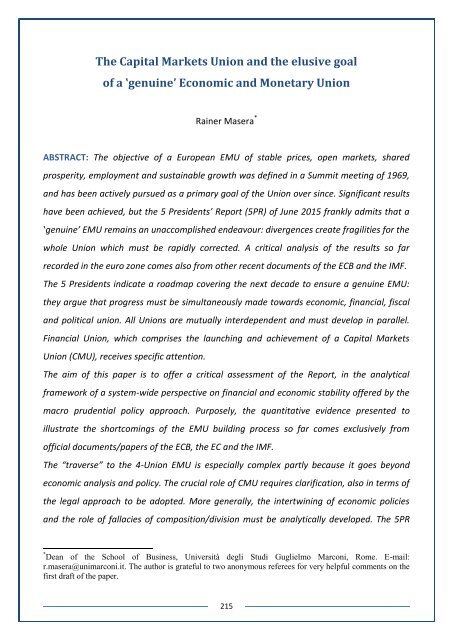ECONOMICS YEARLY REVIEW
Law_and_Economics_Yearly_Review_LEYR_Journal_vol_4_part_2_2015
Law_and_Economics_Yearly_Review_LEYR_Journal_vol_4_part_2_2015
Create successful ePaper yourself
Turn your PDF publications into a flip-book with our unique Google optimized e-Paper software.
The Capital Markets Union and the elusive goal<br />
of a ‛genuine’ Economic and Monetary Union<br />
Rainer Masera *<br />
ABSTRACT: The objective of a European EMU of stable prices, open markets, shared<br />
prosperity, employment and sustainable growth was defined in a Summit meeting of 1969,<br />
and has been actively pursued as a primary goal of the Union over since. Significant results<br />
have been achieved, but the 5 Presidents’ Report (5PR) of June 2015 frankly admits that a<br />
‛genuine’ EMU remains an unaccomplished endeavour: divergences create fragilities for the<br />
whole Union which must be rapidly corrected. A critical analysis of the results so far<br />
recorded in the euro zone comes also from other recent documents of the ECB and the IMF.<br />
The 5 Presidents indicate a roadmap covering the next decade to ensure a genuine EMU:<br />
they argue that progress must be simultaneously made towards economic, financial, fiscal<br />
and political union. All Unions are mutually interdependent and must develop in parallel.<br />
Financial Union, which comprises the launching and achievement of a Capital Markets<br />
Union (CMU), receives specific attention.<br />
The aim of this paper is to offer a critical assessment of the Report, in the analytical<br />
framework of a system-wide perspective on financial and economic stability offered by the<br />
macro prudential policy approach. Purposely, the quantitative evidence presented to<br />
illustrate the shortcomings of the EMU building process so far comes exclusively from<br />
official documents/papers of the ECB, the EC and the IMF.<br />
The “traverse” to the 4-Union EMU is especially complex partly because it goes beyond<br />
economic analysis and policy. The crucial role of CMU requires clarification, also in terms of<br />
the legal approach to be adopted. More generally, the intertwining of economic policies<br />
and the role of fallacies of composition/division must be analytically developed. The 5PR<br />
* Dean of the School of Business, Università degli Studi Guglielmo Marconi, Rome. E-mail:<br />
r.masera@unimarconi.it. The author is grateful to two anonymous referees for very helpful comments on the<br />
first draft of the paper.<br />
215


